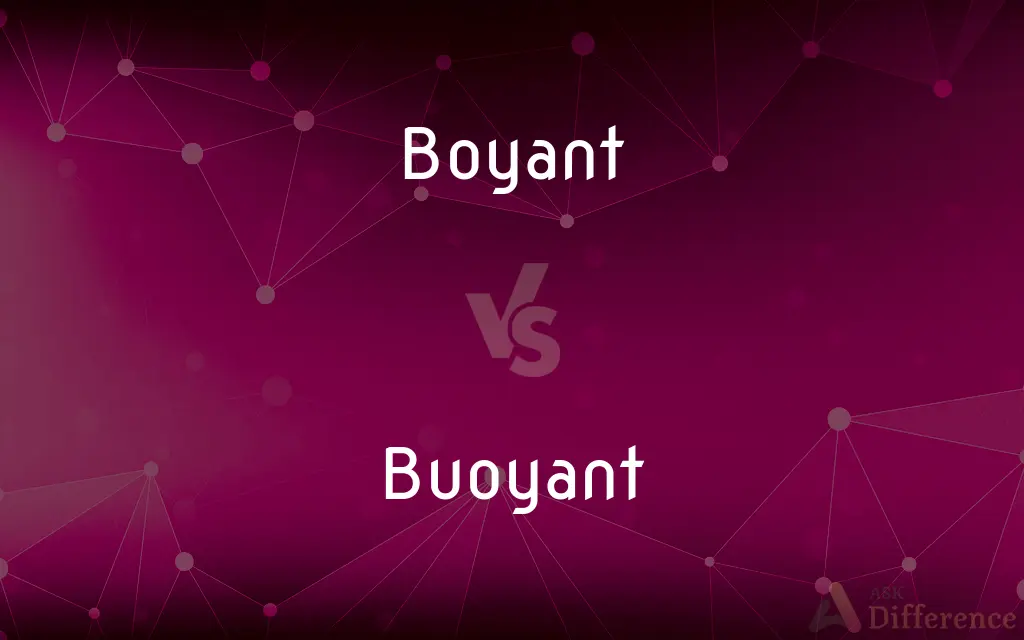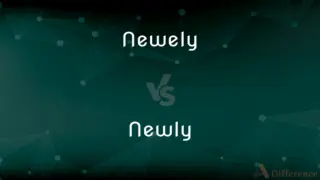Boyant vs. Buoyant — What's the Difference?
By Tayyaba Rehman — Published on August 22, 2023
"Boyant" is incorrect, while "Buoyant" is the correct spelling, referring to the ability to float or rise in liquid or air.

Which is correct: Boyant or Buoyant
How to spell Buoyant?

Boyant
Incorrect Spelling

Buoyant
Correct Spelling
Difference Between Boyant and Buoyant
Table of Contents
ADVERTISEMENT
Key Differences
Remember "u" comes before "o" in "buoyant."
Tayyaba Rehman
Aug 22, 2023
Think of "buoy" as in sea buoys which float, hence "buoyant."
Tayyaba Rehman
Aug 22, 2023
Think of the phrase: "Be 'U'niquely 'O'riginal, be buoyant!"
Tayyaba Rehman
Aug 22, 2023
"Boyant" is missing the 'u', like a buoy missing its anchor.
Tayyaba Rehman
Aug 22, 2023
Visualize something floating up, like the letter "U" in "buoyant" lifting the word.
Tayyaba Rehman
Aug 22, 2023
ADVERTISEMENT
Definitions
Buoyant
Buoyant: Able to float in a fluid.
The rubber duck is buoyant in the bathtub.
Tayyaba Rehman
Aug 19, 2023
Buoyant
Buoyant: Tending to maintain or restore a healthy, positive mood.
After the good news, he felt remarkably buoyant.
Tayyaba Rehman
Aug 19, 2023
Buoyant
Able or tending to keep afloat or rise to the top of a liquid or gas.
Tayyaba Rehman
Aug 21, 2023
Buoyant
Buoyant: Showing a good or favorable outcome.
The stock market is buoyant today.
Tayyaba Rehman
Aug 19, 2023
ADVERTISEMENT
Buoyant
Buoyant: Having resilience or the ability to recover quickly.
The economy is buoyant despite recent challenges.
Tayyaba Rehman
Aug 19, 2023
Buoyant
Buoyant: Cheerful and optimistic.
Her buoyant personality lights up the room.
Tayyaba Rehman
Aug 19, 2023
Buoyant
Cheerful and optimistic
The conference ended with the party in a buoyant mood
Tayyaba Rehman
Aug 21, 2023
Buoyant
(of an economy, business, or market) involving or engaged in much successful trade or activity
Car sales were buoyant
Tayyaba Rehman
Aug 21, 2023
Buoyant
Having the quality of rising or floating in a fluid; tending to rise or float; as, iron is buoyant in mercury.
Tayyaba Rehman
Aug 21, 2023
Buoyant
Bearing up, as a fluid; sustaining another body by being specifically heavier.
The water under me was buoyant.
Tayyaba Rehman
Aug 21, 2023
Buoyant
Light-hearted; vivacious; cheerful; as, a buoyant disposition; buoyant spirits.
Tayyaba Rehman
Aug 21, 2023
Buoyant
Tending to float on a liquid or rise in air or gas;
Buoyant balloons
Buoyant balsawood boats
A floaty scarf
Tayyaba Rehman
Aug 21, 2023
FAQs
Which vowel is used before Buoyant?
The letter "a" is often used before "buoyant" as in "a buoyant object."
Tayyaba Rehman
Aug 22, 2023
What is the plural form of Buoyant?
Buoyant does not have a typical plural form as it's an adjective.
Tayyaba Rehman
Aug 22, 2023
Why is it called Buoyant?
It's called "buoyant" because it's derived from the word "buoy" which refers to an anchored float.
Tayyaba Rehman
Aug 22, 2023
Is Buoyant a vowel or consonant?
Buoyant is a word, not a single letter. It contains both vowels and consonants.
Tayyaba Rehman
Aug 22, 2023
Is the word “Buoyant” a Direct object or an Indirect object?
It's an adjective and doesn't typically function as a direct or indirect object.
Tayyaba Rehman
Aug 22, 2023
Which determiner is used with Buoyant?
Any determiner can be used depending on the context, such as "the," "a," "his," "her," etc.
Tayyaba Rehman
Aug 22, 2023
Which conjunction is used with Buoyant?
Any conjunction can be used with "buoyant" depending on the sentence structure.
Tayyaba Rehman
Aug 22, 2023
Which article is used with Buoyant?
Both "a" and "the" can be used, depending on context.
Tayyaba Rehman
Aug 22, 2023
Is the Buoyant term a metaphor?
It can be used metaphorically to describe mood or economy.
Tayyaba Rehman
Aug 22, 2023
What is the first form of Buoyant?
Buoyant is an adjective, so it doesn't have verb forms.
Tayyaba Rehman
Aug 22, 2023
How is Buoyant used in a sentence?
The boat was buoyant enough to hold all the passengers safely.
Tayyaba Rehman
Aug 22, 2023
Author Spotlight
Written by
Tayyaba RehmanTayyaba Rehman is a distinguished writer, currently serving as a primary contributor to askdifference.com. As a researcher in semantics and etymology, Tayyaba's passion for the complexity of languages and their distinctions has found a perfect home on the platform. Tayyaba delves into the intricacies of language, distinguishing between commonly confused words and phrases, thereby providing clarity for readers worldwide.

















































